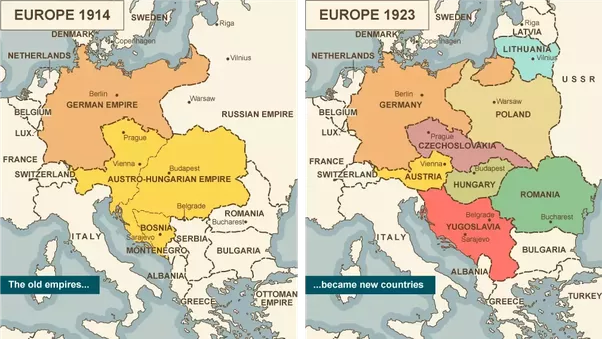In what ways did the post-Versailles order augment ethnic tensions? Part 3.

When reflecting on the influence of new borders one should first understand the mindset of the people who drafted them, and, while it would not be nonsensical to ascribe authorship of the Versailles order in Central and Eastern Europe to the likes of Petrula, Piłsudski or Horthy, it is the great powers that had most influence on the shape of new states in the region. Mieczysław Jałowiecki, a Polish diplomat, recounts an anecdote about the genesis of the Curzon line. Apparently the British had no idea how to tell Poland and Russia apart and drawing a border proved so difficult that the delegates were delayed to lunch and consequently very annoyed. Lord Curzon, who resigned from the post of viceroy of India in 1905 in wake of a rather unfortunate partition of Bengal, hastily concluded the matter by producing an old map titled „The second partition of Poland” where the border between Russia and Poland was drawn with a conveniently simple red line, which was immediately agreed upon as the border. [1] It would be incredibly hard to credit the likes of Lord Curzon with a deep concern for self-government of nations and the resolution of ethnic tensions. The creation of the so called little entente could better be elucidated with French distrust of the German element not to mention that the notion of nations deserving self rule is not well compatible with colonialism. The partition of Bengal that Lord Curzon approved of may have employed ethnicity as a criterion yet it was a purely administrative decision meant to facilitate rule on the Indian subcontinent, similarly the Versailles order should not be seen as an enlightened program to grant sovereignty but rather to pacify Europe.
The reader might be puzzled with my choice of cases. I hasten to provide my rationale: I am of the opinion that the conflicts I described are most ethnically charged of all the inter-war disputes, for the tensions between e.g. Germany and France are understood better as conflicts of states where the opinion of the populace is to some extent tailored by propaganda to fit state policy, while in the cases of Hungary and Poland the state was more connected to that elusive force that I have previously named 'will of the nation', although naturally telling unaltered convictions of the populace from propaganda induced prejudice is as impossible a task as defining when an ethnicity becomes a nation or when state policy stops being a manifestation of what the nation approves of, not to mention that the application of words like 'will' to groups of people tends to be problematic.
I have demonstrated that ethnic tensions are either the product of national ideology as in the case of Hungary or a stage in the nation-building process as with the genesis of Ukraine. According to Ericksen, ethnicity is an aspect of group relationship to another group and social relationships only have an ethnic element when differences are considered to be relevant. [2] This would imply that ethnic tensions lead to nation building as it can well be argued that nations create an identity in opposition to alien groups. In this paper I have argued mainly using the opposite rhetoric, namely that states create ethnic conflict, yet that is not a contradiction for I think it is safe to assume that the processes described form a hermeneutic circle and constantly interact.
The Versailles order did not fail to resolve ethnic tensions because that was not it's primary goal, yet even if it had been I doubt any other outcome would be have been possible. The given examples illustrate the complexity of the situation and the amount of processes in play, by focusing on one aspect we loose the grand picture. Bearing the former in mind and calling upon all that has been written I affirm that new borders either created new nations or redefined old ones, giving them a new purpose incompatible with the purposes of others, thus bringing ethnic conflict to a new level: one in which the state is both the trophy and the weapon of the ethnicity turned nation.
[1] - Mieczysław Jałowiecki, Na skraju Imperium i inne wspomnienia,
(Warszawa, 2013), p. 613–4;
David Gilmour, Cuzron; Imperial statesman 1895-1925,
(Cambridge, 1994), p. 271-3, 322-4
[2] - Thomas Eriksen, Ethnicity & Nationalism; Anthropological perspectives,
(London 1993), p. 18